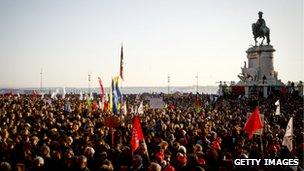Portugal passes fourth EU-IMF bailout review
- Published

The Portuguese are feeling the economic strain
Portugal has passed a fourth review of its continuing spending cuts and economic reforms, the country's Finance Minister, Vitor Gaspar, has said.
Portugal had fulfilled all the bailout criteria set by inspectors from the EU, European Central Bank and International Monetary Fund (IMF), Mr Gaspar said.
It clears the way for the government to get another 4bn euros ($5bn; £3.2bn) of funds from the so-called troika.
Portugal is to get 78bn euros in total under the bailout, agreed in May 2011.
"According to the evaluation made by international institutions, we are respecting our recovery programme," Mr Gaspar told a news conference.
In another development, the finance ministry said it would inject more than 6.65bn euros into three of the country's banks to improve their liquidity.
The beneficiaries are two private banks, BCP and BPI, and the state-owned CGD. The aim is to help them meet new liquidity standards drawn up by the European Banking Authority.
The money for BCP and BPI will come from the EU-IMF bailout package. CGD, as a publicly-owned institution, is not eligible for bailout money and will receive 1bn euros from other government funds.
Holidays scrapped
The Portuguese government has been working hard to continue to cut costs, despite a steep recession and an unemployment rate of 15.2%, the third highest in the eurozone, after Spain and Greece.

Portugal's austerity programme has sparked major protests
Last month, it took austerity measures to a new level with the decision to scrap four of its 14 public holidays.
Two religious festivals and two other public holidays will be suspended for five years from 2013.
The decision over which Catholic festivals to cut was negotiated with the Vatican.
Portugal has already cut public sector wages and raised taxes to reduce its budget deficit and deal with its economic crisis.
Measures like that have won praise from the troika and Portugal has, so far, received its bailout funds with much less drama than Greece.
But the gain has not come without pain for Portugal.
There have been deep cost cuts that are hitting public sector workers particularly hard, with many people facing a steep reduction in income.
That has prompted mass protests and two general strikes in the past year.